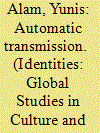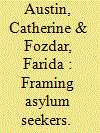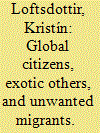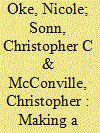|
|
|
Sort Order |
|
|
|
Items / Page
|
|
|
|
|
|
|
| Srl | Item |
| 1 |
ID:
160447


|
|
|
|
|
| Summary/Abstract |
This article analyses the relational and emotional logics of migration, separation and reunification of Bangladeshi families in Italy. Migrant husbands are separated from their wives, with whom they have had little family life due to their migration, and seek family reunification. Wives’ migration due to family reunification, however, means separating them from their familiar environments and social networks. For this reason, some wives press for onward migration to the UK, where they hope that a larger Bangladeshi community and more social and cultural opportunities may provide a more fulfilling life compared to what they experienced in Italy. However, this means uprooting their husbands once again. The article observes the emotionally divergent dimensions among men and women as an element that can transform and redefine biographical projects and the migration trajectories in Europe of Bangladeshi families in Italy.
|
|
|
|
|
|
|
|
|
|
|
|
|
|
|
|
| 2 |
ID:
160443


|
|
|
|
|
| Summary/Abstract |
This article is based on ethnographic research carried out in Bradford, an ethnically diverse city situated in the north of England. The sample of over 60 participants mostly comprises males of British Pakistani Muslim heritage but varies in terms other markers of identity such as social class, profession and residential/working locale. The article analyses the cultural value and meaning of cars within a multicultural context and how a consumer object can feed into the processes which refine and embed racialized identities. Small case studies reveal the concrete and discursive ways through which ideas around identity and ethnicity are transmitted and how, in particular, racialization continues to feature as a live, active and recognizable process in everyday experience.
|
|
|
|
|
|
|
|
|
|
|
|
|
|
|
|
| 3 |
ID:
160441


|
|
|
|
|
| Summary/Abstract |
Dilemmas around how to deal with asylum seekers who arrive in Australia by boat have been a key driver of political and public discourse for over a decade. In 2012, an ‘Expert Panel on Asylum Seekers’ was established to provide advice to the Australian government about how to deal with the increasingly embarrassing issue of asylum seekers drowning at sea and a parliamentary stalemate on the matter. Using frame analysis to understand how national and post-national identities are being recruited in this debate, this paper analyses submissions to the Panel. We demonstrate how arguments for and against asylum seekers are constructed around nationalism, regionalism and globalism (cosmopolitan). Australia was variously framed as having an alternative national character from that promoted by politicians, as having a key regional role, and hence identity, and as a global citizen (both in reality and in appearance). Contrary to expectations, we found that each frame served as a vehicle through which progressive arguments were articulated, indicating the utility of each in arguing for more humane treatment of ‘Others’.
|
|
|
|
|
|
|
|
|
|
|
|
|
|
|
|
| 4 |
ID:
160444


|
|
|
|
|
| Summary/Abstract |
This article reflects on Europe’s problematic relationship with its ‘others’, asking in particular how the idea of the ‘exotic’ – constituting one of Europe’s ‘imperial ruins’ – intersects with the figure of the Muslim migrant. The Muslim migrant has in the present become in Europe a potent marker of otherness, which reflects how some cosmopolitan aspirations are perceived negatively in European discourses, revealing how mobility itself is racilized and gendered. WoDaaBe Fulani migrants from Niger have historically occupied a subject position in Europe as identified with ‘the exotic’. The article discusses WoDaaBe temporary migration to Europe to supplement their income back home, and their intersecting positions as ‘exotic’, as Muslims and black Africans. While contemporary discourses tend to highlight Europe’s status as a site of equality, human rights, and cradle of civilization, some bodies are welcome within the space of Europe while others are not.
|
|
|
|
|
|
|
|
|
|
|
|
|
|
|
|
| 5 |
ID:
160446


|
|
|
|
|
| Summary/Abstract |
This article provides an exploratory analysis of the life narratives of migrants in the Portuguese-speaking world. By interweaving the life experiences of eight participants in three thematic clusters – ‘shared past’, language and sense of community – we propose a critique of the deep-seated idea of the Lusophone space as a community constructed by the harmonious conviviality of different countries and people. Drawing on contributions from cultural studies, social psychology, anthropology and sociology, we first aim to give voice to the human subjects who embark on migrations and then to understand how the engendered process of identity construction is framed by their social world, simultaneously reframing it. Thus, we aim at shedding light on the ways in which aspects of the political discourses on Lusophony are used (and are instrumental) to the migrants’ identity narrative (re)construction.
|
|
|
|
|
|
|
|
|
|
|
|
|
|
|
|
| 6 |
ID:
160445


|
|
|
|
|
| Summary/Abstract |
In this article, we explore through analyses of interviews the meanings and experiences of everyday multiculturalism in a suburb in Melbourne, Australia. The people we interviewed valued and experienced diversity in different, yet interrelated ways: as an experience of multiculturalism, as providing comfort in diversity and as embodied in ethnic hubs in a segmented geography. Everyday racism can make forging belonging and connections across diverse ethnic groups difficult. Yet, Footscray is constructed as a place in which diversity is regarded as normative and protective. Our focus on a local suburb has allowed us to develop insight into the diverse ways identities are constituted through multiple understandings and experiences of diversity.
|
|
|
|
|
|
|
|
|
|
|
|
|
|
|
|
| 7 |
ID:
160442


|
|
|
|
|
| Summary/Abstract |
This article investigates the relationship between asabiyya (esprit de corps) and political violence within the context of the Kurdish experience, which relies heavily on the presence and activities of armed groups within the society. Furthermore, this article reveals different possibilities for how an armed group can be diffused into a close ethnic unit and transforms its collective solidarity and consciousness by orienting it towards the use of violence. Lastly, it concludes that this engagement changes the content and forms of asabiyya while reshaping social identities in a complex way.
|
|
|
|
|
|
|
|
|
|
|
|
|
|
|
|
|
|
|
|
|